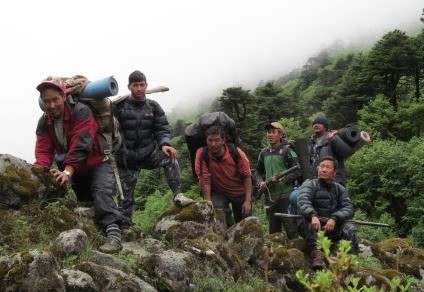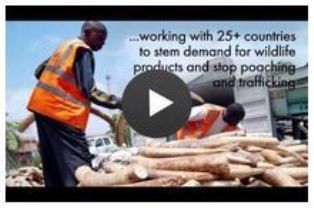- What We Do
- Agriculture and Food Security
- Democracy, Human Rights and Governance
- Economic Growth and Trade
- Education
- Ending Extreme Poverty
- Environment and Global Climate Change
- Global Climate Change
- Conserving Biodiversity and Forests
- Sustainable Urbanization for Global Progress and Security
- Securing Land Tenure and Property Rights for Stability and Prosperity
- Sustainable Land Management
- Environmental Impact Assessment
- Knowledge Management for Environment and Natural Resources
- Sustainable Tourism
- Earth Day
- Gender Equality and Women's Empowerment
- Global Health
- Water and Sanitation
- Working in Crises and Conflict
- U.S. Global Development Lab
Conservation is an American tradition, and it is important to USAID’s mission as an international development agency. Healthy natural systems provide goods and services that sustain life and improve human well-being. Unfortunately, over the last century, nature has been degraded at an increasingly rapid pace and the world’s poorest have suffered the most. Conservation actions, such as enforcing wildlife laws and partnering with indigenous communities to protect forests, can safeguard nature’s benefits while leading to equitable and sustainable development in rural areas. Through a comprehensive, collaborative and evidence-based approach to conservation, USAID aims to diversify livelihoods, end extreme poverty, improve peace and security, empower women and build resilient societies.
USAID’s new Biodiversity Policy builds on decades of conservation experience. The policy prioritizes investments in specific geographic areas, uses the best science available and works through partnerships to achieve cost-effective results. It offers clear guidance from USAID to:
- Address pressing threats to nature, including wildlife trafficking (PDF 274KB) and illegal logging. These activities harm nature, endanger communities and weaken national security.
- Use proven approaches to conservation, such as close collaboration and participation of communities and indigenous peoples [PDF 141K], ensuring that local knowledge is respected and applied to development challenges.
- Partner [PDF, 128K]with the private sector, nongovernmental organizations, research institutions, and fellow government agencies. Working together ensures that the best ideas are put into practice.
- Harness innovations in science and technology [PDF, 132K]. Solving the biggest conservation challenges requires new tools and methods.
Follow the links above or below to download two-page briefs on each topic.
USAID’S WORK IN ACTION

EMPOWERING COMMUNITIES TO REDUCE POACHING AND STRENGTHEN DEMOCRACY
Through partnerships with communities in Nepal, USAID has achieved results that resonate beyond the country. Despite Nepal’s extended civil war, USAID has worked with community groups to better manage their forests. Now, through community-based forestry, more than 40 percent of Nepalis enjoy greater transparency in decision-making, less corruption, more equitable benefit sharing, strengthened social networks and greater economic empowerment of marginalized women. USAID has also engaged the youth of Nepal to form 125 anti-poaching units with more than 1,840 members. These groups support park authorities by monitoring wildlife, helping to control forest fires, and providing critical information about ongoing illegal activities. They also generate awareness of poaching in their communities through public performances, home visits, pamphlets and posters, rallies, games, folk songs and radio programs. USAID improves the economic future of these youth through training in marketable skills such as fish farming and repairing mobile phones, bikes and electrical appliances. These consistent, long-term investments in community conservation have reduced the incentives for poaching and provided a better future for Nepal.
RELATED RESOURCES:
Conservation is Wildlife UPDATE (PDF 274KB)
Conservation is Development (Video)
Conservation is Development (PDF)
Conservation is People (PDF)
Conservation is Wildlife (PDF)
Conservation is Science & Technology (PDF)
Conservation is Partnerships (PDF)








Comment
Make a general inquiry or suggest an improvement.